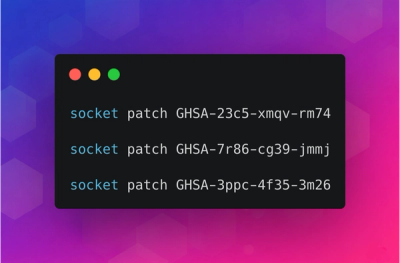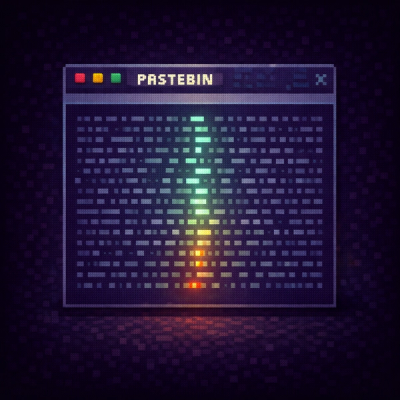
Security News
minimatch Patches 3 High-Severity ReDoS Vulnerabilities
minimatch patched three high-severity ReDoS vulnerabilities that can stall the Node.js event loop, and Socket has released free certified patches.
@adonisjs/attachment-lite
Advanced tools
Turn any field on your Lucid model to an attachment data type

A simple, opinionated package to convert any column on your Lucid model to an attachment data type.
Attachment lite allows you to store a reference of user uploaded files within the database. It does not require any additional database tables and stores the file metadata as JSON within the same column.
The attachment-lite package is an alternative to the media library approach. I believe media libraries are great when creating a CMS that wants a central place to keep all the images/documents.
However, many applications like a SAAS product or a community forum do not need media libraries.
For example, websites like Twitter or dev.to don't have a media library section where you upload and choose images from. Instead, images on these platforms are tightly coupled with the resource.
When you update your profile image on Twitter, the old image disappears, and the new one appears. There is no central gallery of images to choose the profile picture from.
A very long story to tell you that the attachment-lite package is an excellent solution for managing one-off file uploads in your application.
The attachment-lite package requires @adonisjs/lucid >= v16.3.1 and @adonisjs/core >= 5.3.4.
Also, it relies on AdonisJS drive for writing files on the disk.
Install the package from the npm registry as follows.
npm i @adonisjs/attachment-lite
Next, configure the package by running the following ace command.
node ace configure @adonisjs/attachment-lite
Often times, the size of the image metadata could exceed the allowable length of an SQL String data type. So, it is recommended to create/modify the column which will hold the metadata to use a JSON data type.
If you are creating the column for the first time, make sure that you use the JSON data type. Example:
// Within the migration file
protected tableName = 'users'
public async up() {
this.schema.createTable(this.tableName, (table) => {
table.increments()
table.json('avatar') // <-- Use a JSON data type
})
}
If you already have a column for storing image paths/URLs, you need to create a new migration and alter the column definition to a JSON data type. Example:
# Create a new migration file
node ace make:migration change_avatar_column_to_json --table=users
// Within the migration file
protected tableName = 'users'
public async up() {
this.schema.alterTable(this.tableName, (table) => {
table.json('avatar').alter() // <-- Alter the column definition
})
}
Next, in the model, import the attachment decorator and the AttachmentContract interface from the package.
Make sure NOT to use the
@columndecorator when using the@attachmentdecorator.
import { BaseModel } from '@ioc:Adonis/Lucid/Orm'
import {
attachment,
AttachmentContract
} from '@ioc:Adonis/Addons/AttachmentLite'
class User extends BaseModel {
@attachment()
public avatar: AttachmentContract
}
Now you can create an attachment from the user uploaded file as follows.
import { Attachment } from '@ioc:Adonis/Addons/AttachmentLite'
class UsersController {
public store({ request }: HttpContextContract) {
const avatar = request.file('avatar')!
const user = new User()
user.avatar = Attachment.fromFile(avatar)
await user.save()
}
}
The Attachment.fromFile creates an instance of the Attachment class from the user uploaded file. When you persist the model to the database, the attachment-lite will write the file to the disk.
You can update the property with a newly uploaded user file, and the package will take care of removing the old file and storing the new one.
import { Attachment } from '@ioc:Adonis/Addons/AttachmentLite'
class UsersController {
public update({ request }: HttpContextContract) {
const user = await User.firstOrFail()
const avatar = request.file('avatar')!
user.avatar = Attachment.fromFile(avatar)
// Old file will be removed from the disk as well.
await user.save()
}
}
Similarly, assign null value to the model property to delete the file without assigning a new file.
Also, make sure you update the property type on the model to be null as well.
class User extends BaseModel {
@attachment()
public avatar: AttachmentContract | null
}
const user = await User.first()
user.avatar = null
// Removes the file from the disk
await user.save()
Upon deleting the model instance, all the related attachments will be removed from the disk.
Do note: For attachment lite to delete files, you will have to use the
modelInstance.deletemethod. Usingdeleteon the query builder will not work.
const user = await User.first()
// Removes any attachments related to this user
await user.delete()
By default, all files are written/deleted from the default disk. However, you can specify a custom disk at the time of using the attachment decorator.
The
diskproperty value is never persisted to the database. It means, if you first define the disk ass3, upload a few files and then change the disk value togcs, the package will look for files using thegcsdisk.
class User extends BaseModel {
@attachment({ disk: 's3' })
public avatar: AttachmentContract
}
You can also store files inside the subfolder by defining the folder property as follows.
class User extends BaseModel {
@attachment({ folder: 'avatars' })
public avatar: AttachmentContract
}
You can generate a URL for a given attachment using the getUrl or getSignedUrl methods. They are identical to the Drive methods, just that you don't have to specify the file name.
await user.avatar.getSignedUrl({ expiresIn: '30mins' })
The Drive API methods for generating URLs are asynchronous, whereas serializing a model to JSON is synchronous. Therefore, it is not to create URLs at the time of serializing a model.
// ❌ Does not work
const users = await User.all()
users.map((user) => {
user.avatar.url = await user.avatar.getSignedUrl()
return user
})
To address this use case, you can opt for pre-computing URLs
Enable the preComputeUrl flag to pre compute the URLs after SELECT queries. For example:
class User extends BaseModel {
@attachment({ preComputeUrl: true })
public avatar: AttachmentContract
}
Fetch result
const users = await User.all()
users[0].avatar.url // pre computed already
Find result
const user = await User.findOrFail(1)
user.avatar.url // pre computed already
Pagination result
const users = await User.query.paginate(1)
users[0].avatar.url // pre computed already
The preComputeUrl property will generate the URL and set it on the Attachment class instance. Also, a signed URL is generated when the disk is private, and a normal URL is generated when the disk is public.
We recommend not enabling the preComputeUrl option when you need the URL for just one or two queries and not within the rest of your application.
For those couple of queries, you can manually compute the URLs within the controller. Here's a small helper method that you can drop on the model directly.
class User extends BaseModel {
public static async preComputeUrls(models: User | User[]) {
if (Array.isArray(models)) {
await Promise.all(models.map((model) => this.preComputeUrls(model)))
return
}
await models.avatar?.computeUrl()
await models.coverImage?.computeUrl()
}
}
And now use it as follows.
const users = await User.all()
await User.preComputeUrls(users)
return users
Or for a single user
const user = await User.findOrFail(1)
await User.preComputeUrls(user)
return user
Attachment lite primarly uses the multipart request body to persist user upload files. However, you can also construct an instance of Attachment class manually and use the AdonisJS drive to persist the corresponding file.
In the following example, we create an instance of the Attachment class to represent the Post cover image.
import Post from 'App/Models/Post'
import Drive from '@ioc:Adonis/Core/Drive'
import { file } from '@ioc:Adonis/Core/Helpers'
import Factory from '@ioc:Adonis/Lucid/Factory'
import { Attachment } from '@ioc:Adonis/Addons/AttachmentLite'
export default Factory.define(Post, async ({ faker }) => {
/**
* Step 1: Create an instance of attachment
*/
const coverImage = new Attachment({
extname: 'png',
mimeType: 'image/png',
size: 10 * 1000,
name: `${faker.random.alphaNumeric(10)}.png`,
})
/**
* Step 2: Mark image as persisted, this will disable the
* functions of attachment lite that looks for multipart
* body and attempts to write the file from the stream
*/
coverImage.isPersisted = true
/**
* Step 3: Persist the file using Drive.
*/
await Drive.put(coverImage.name, (await file.generatePng('1mb')).contents)
return {
title: faker.lorem.words(5),
coverImage: coverImage,
}
}).build()
FAQs
Turn any field on your Lucid model to an attachment data type
We found that @adonisjs/attachment-lite demonstrated a not healthy version release cadence and project activity because the last version was released a year ago. It has 3 open source maintainers collaborating on the project.
Did you know?

Socket for GitHub automatically highlights issues in each pull request and monitors the health of all your open source dependencies. Discover the contents of your packages and block harmful activity before you install or update your dependencies.

Security News
minimatch patched three high-severity ReDoS vulnerabilities that can stall the Node.js event loop, and Socket has released free certified patches.

Research
/Security News
Socket uncovered 26 malicious npm packages tied to North Korea's Contagious Interview campaign, retrieving a live 9-module infostealer and RAT from the adversary's C2.

Research
An impersonated golang.org/x/crypto clone exfiltrates passwords, executes a remote shell stager, and delivers a Rekoobe backdoor on Linux.